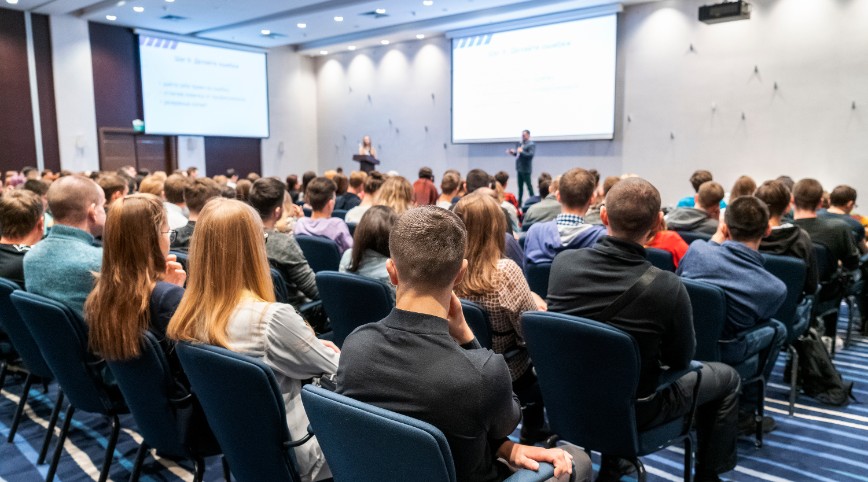February 29th, 2024 | Alex
Maximising Impact with B2B Event Marketing: Strategies for Success
When it comes to networking and meeting other business owners, it doesn’t get much better than attending B2B (business-to-business) events.
These events will host a variety of business owners who have the potential to make new connections that could lead to business opportunities.
As a business owner, you want to ensure you have a healthy stream of new connections so that you can always tap into new networks and help grow your business and brand.
We’re a live events PR company, so we know the potential these events have for you and the businesses that attend them.
In this post, we will take a deeper look into the world of B2B event marketing as well as strategies you can use for success.
What is B2B Event Marketing?
B2B event marketing is leveraging the power of events to help business owners foster new relationships with one another in the hope they can potentially do business together.
Engaging with other business owners at events can be a powerful way to get new leads, strike up partnerships and learn from others who are successful.
When you’re at a B2B event the main objective is to talk to as many new people as possible so that you have a higher chance of meeting someone you connect with.
There can also be speakers at these events which allow you to get some added value besides making new business connections.

Why is B2B Event Marketing Important?
Getting through to a decision-maker at a business can be difficult.
You could be chasing a lead for months on end only to never get a chance to speak directly with the decision-maker.
This is a fundamental reason why B2B event marketing can be so crucial to your business and overall marketing strategy.
You get a chance to be face to face with decision-makers of companies.
You won’t need to speak with their staff or try to get through a gatekeeper. You’ll have an opportunity to make an impression on them directly.
If your business has a USP (unique selling point) or expertise that aligns with other business owners at these events then you’ll be able to capture their attention fully.
Something that isn’t so easy to do over the phone or email.
Types of B2B Event Marketing
B2B events come in many different forms. Let’s look at the most common types.
Conferences and Trade Shows
Conferences bring together professionals within a specific industry.
They often include keynote speakers, panel discussions, and networking opportunities.
Having speakers offers unique insights from industry experts that can’t be found anywhere else except online.
Certain conferences even have Q&A sessions which further boost engagement and allow attendees to get a tailored experience.
Trade shows and expos showcase products and services within a particular industry. Businesses set up booths to display their offerings and engage with attendees.
Seminars and Workshops
Hosting seminars on relevant industry topics can position your business as an industry leader and attract businesses interested in learning and development.
If you are an attendee of the seminar or workshop then this gives you the chance to mingle with like-minded individuals.
Workshops provide a more interactive setting for businesses to learn about a product or service.
These workshops can focus on specific industry challenges that business owners face giving them a practical approach to overcome them.
Seminars and workshops tend to attract high-calibre business owners as they are there to not only network but also learn something new and upskill themselves.

Webinars and Virtual Events
Online seminars or webinars are convenient for reaching people from all over the world. This reach is something you simply couldn’t achieve by doing in-person events only.
While webinars and virtual events aren’t as great for networking due to the lack of interaction with people, they can still pose networking opportunities.
You’ll need to be proactive when seeking networking opportunities over webinars or virtual events.
If you want to connect with someone then send them a message or reach out to them in some capacity.
Prepare in advance and create a list of individuals you believe may be of interest to you and make an introduction.
They may not answer the first time which is why it’s vitally important that you follow up.
They may get spammy messages all of the time so you need to personalise your message and make it stand out from the crowd.

Product Launch Events
Introducing a new product or service through a dedicated event can generate excitement and interest.
While this may be more suited to a B2C (business to consumer), the fact of the matter is that business owners attend these events also.
This makes these events great for showcasing new products and services and also for meeting other like-minded business owners.
These events may include demonstrations, testimonials, and opportunities for attendees to experience the product firsthand.
What is a B2B Event Marketing Strategy?
Here are key components and considerations for a B2B event marketing strategy:
Define Objectives
Clearly defining objectives is a fundamental step in any marketing strategy, including B2B event marketing.
Defining objectives helps ensure that your B2B event marketing efforts align with the broader goals of your business.
This alignment ensures that the resources invested in the event contribute to the overall success and growth of the organisation.
Objectives provide focus and clarity, helping you and your team understand what you aim to achieve with the B2B event.
This clarity guides decision-making throughout the planning and execution process, reducing the risk of drifting away from the primary goals.
Clear objectives allow you to tailor your B2B event marketing strategy to specific outcomes.
Whether your primary goal is lead generation, brand awareness, thought leadership, or customer engagement, a focused strategy increases the likelihood of success.
Target Audience Identification
If you don’t know who you’re targeting with your strategy you’ll just keep going around in circles.
It’s vitally important you get a clear image of your ideal customer.
Conduct market research and start to gather information about your prospect’s age, gender, financial capabilities and everything else worth knowing.
Understand their interests, hobbies and values so you can identify what motivates them and ultimately drives their behaviour.
Look at competitors and analyse their audience. It will more than likely be very aligned with what your target audience will look like too.
Market Research
Now you’ve identified your audience you need to do a deep dive into them and the market they operate in.
Determine the problems and challenges that your target audience is facing using thorough research.
Conducting market research on your audience allows you to get information on a large sample of relevant prospects.
This is great for your business as you can get a full view of their wants, needs and desires without a biased view or working off assumptions.
Clarity is key and proper market research can get you that.
Here are a selection of questions that you could ask your audience for market research purposes:
- What are your interests, hobbies, and lifestyle choices?
- What values and beliefs are important to you?
- What factors influence your purchasing decisions?
- Where do you typically research products or services before making a purchase?
- Have you used similar products or services in the past?
- What do you perceive as the strengths and weaknesses of our competitors?
- Are there any emerging trends in the industry that you are aware of?
- Are there any additional features or improvements you would like to see?
- How would you rate the quality of our customer support?
Value Proposition
A value proposition is a concise statement that articulates the unique benefits and value that a product, service, or brand offers to its customers.
A well-crafted value proposition communicates the distinct advantages and solutions that your business provides, addressing the needs and desires of your target audience.
You need to clearly communicate the primary benefit or solution that your product or service offers.
Also, avoid jargon or complex language that may confuse your audience.
Tailor your value proposition to address the specific needs and pain points of your target audience.
Make it relevant to their challenges and aspirations.
Highlight what sets your offering apart from the competition. This could be a unique feature, a specific benefit, superior quality, or a distinctive aspect of your brand.
Keep the value proposition brief and to the point. Aim for clarity and brevity to capture your audience’s attention quickly.
Event Selection
Choose the right type of events that align with your business goals and target audience.
Consider industry-specific conferences, trade shows, or niche events that your potential clients are likely to attend.
You might not need to book a specific location if you wish to host online workshops or seminars.
Knowing your target audience will be the main determining factor of this.
After all, if your target audience is based in a faraway location then it might make more sense to have a virtual event.
But if they are concentrated in a particular location or city, then an in-person event space might be a better option.
This is where your goals and objectives will play their part too. If your main aim is networking and lead gen then in-person will likely have a better impact than online events.

Branding and Messaging
Clearly defining branding and messaging for your B2B event marketing strategy is essential to creating an impactful presence at industry events.
Your brand represents the identity and values of your business, and a well-defined brand ensures consistency in how you are perceived by the audience.
Crafting a clear and compelling message that resonates with your target audience helps communicate the unique value propositions of your products or services.
Consistent branding and messaging across various elements, such as booth design, promotional materials, and presentations, reinforce brand recognition and build trust among potential clients.
Content Strategy
Plan and create valuable content for your event, such as presentations, workshops, or demonstrations.
Content should provide solutions to challenges faced by your target audience and position your business as an industry leader.
Engaging and relevant content is what will attract more eyeballs to your brand. It will also allow your existing audience to become more informed of your brand.
You can share insights and mention trending topics which can paint your brand in a better light and showcase your authority on a particle subject.
A well-planned content strategy also feeds into your business’ digital marketing strategy which will boost the online presence of your brand and create a marketing ecosystem.
Metrics and Evaluation
Define key performance indicators (KPIs) to measure the success of your B2B event marketing strategy.
Analyse metrics such as lead conversion, brand visibility, and return on investment (ROI) to refine future strategies.
Data is huge in marketing strategies.
This data will enable you to get a complete picture of how the strategy went and ultimately, if it was a success or not.
You’ll have the chance to look at customer feedback and behaviours to see if any insights can be made.
Past data also lets you predict the future. Your audience’s past actions are a great indicator of their future actions.
Post-Event Analysis
Conduct a thorough analysis of the event’s performance. Identify what worked well and areas for improvement.
Use insights from the analysis to refine your future B2B event marketing strategies. When an evaluation is done correctly you can refine and improve your strategy for the future.
This part of the process fosters a culture of continuous improvement, ensuring that each B2B event becomes a learning opportunity.
With the high demand for live events, you must get your event strategy on point.
B2B Marketing Strategies that Work – Gala PR
By carefully planning and executing a B2B event marketing strategy, businesses can create meaningful connections with potential clients and drive business growth within their target market.
Gala PR is a live events PR company that has developed many successful B2B event marketing strategies over the years.
Our deep understanding of the events industry helps us develop unique and innovative strategies that help our clients reach the right people.
If you’re a business owner and need help with your B2B event marketing strategy then please contact us.